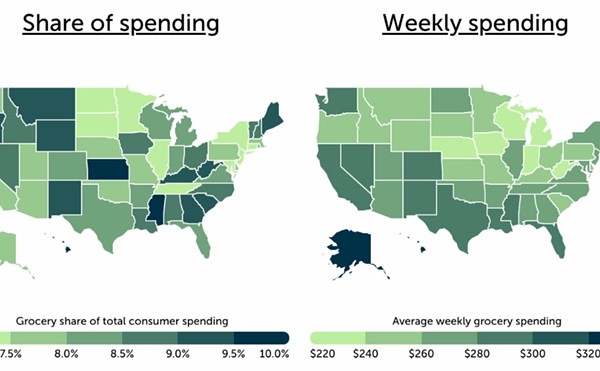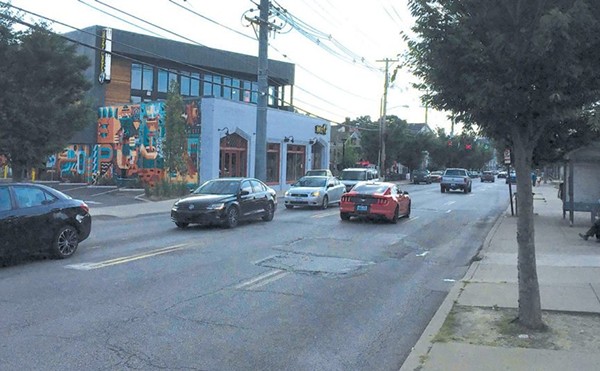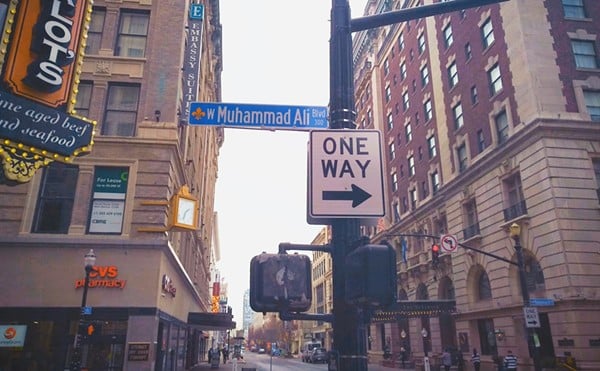
She is a writer and activist. She bursts into laughter at the thought: Rich writers trying to tell Appalachians what it’s about.
It takes little beyond her streaming internal monologue for Anne Shelby to go to pieces in hysterical laughter, a charming sound that begins as a rolling giggle quickly punctuated by bursts of sharp, terse howls. It’s a fun, joyous laugh that makes all of the muscles in her face flex and her arms move about, as if trying to deflect the onslaught of humor.
Her sense of humor is essentially what sustains her: She’s a bleeding heart liberal, living and writing in one of the nation’s most conservative places, Clay County, Kentucky. Since 2000, when she “came out” as a Democrat, Anne Shelby has crafted hundreds of newspaper columns for various regional outlets, many dealing with the fairly severe social ramifications of being an outspoken Democrat in a small, decidedly Republican place.

Two new collections of Shelby’s work — “Can a Democrat Get Into Heaven?,” which consists of 76 of her newspaper columns, and “Appalachian Studies,” 20 years of collected poetry — have just been released. Each offers an original look into what it’s like to be the alien in church, someone whose truest inclination is to be home — except home is a place where it’s hard to be true without consequences. A rural urbanite whose connection to Louisville is both familial (her son Graham Shelby, a writer and former WFPL-FM commentator, lives here with his family) and visceral, Anne Shelby brings the city to the country, and the country to the city. It all makes for a fantastic trip through the general weirdness that can occur when what you consider normal, your neighbors think of as godless hedonism.
On this day, Anne Shelby is wearing a black T-shirt and jeans rolled to the middle of her shins, with red open-toe shoes and the black-framed rectangular glasses common among today’s young hipster crowd. A streak of magnificent silver in her brown hair starts at her forehead and weaves toward her haphazard ponytail. The tips of her fingers — particularly her left hand — have gone slightly blue from eating freshly picked blackberries that came from a wild patch just down the hill from her pre-Civil War home, settled commandingly atop 75 acres of rolling, green Appalachia, 100 miles southeast of Lexington. The beauty of the place is unmitigated and grand: From the back porch, the eye sees only ruminations on green and the staggered cutoff line of the blue, open sky.
The home that Anne Shelby shares with her husband Edmund, a journalist, has very low ceilings. At least in the old part, the part that’s been in her family since way before she was alive. It’s made mostly of indigenous pine, and has undergone a number of transformations since 1992, when Anne and Edmund Shelby came here from Lexington, where they’d lived for 15 years. For instance, there’s a building attached to the side of the original home that houses a fairly modern kitchen, office, bedrooms, and the hallway where Anne Shelby keeps her somewhat informal archives: Five children’s books, four plays (all done with the Pleiades Theater Company in Louisville), and numerous one-off articles and columns from more than 10 Kentucky newspapers. (Disclosure: Anne Shelby and I both had stories printed in a book called “Missing Mountains,” a collection of essays and articles about mountaintop removal mining released last year by Wind Publications, the same imprint that just launched “Appalachian Studies.”)
Just outside the dining room is a fenced area that — before they learned how to escape — housed the Shelby dog clan, which currently numbers 18. Most are fiercely loyal to Anne; even when she’s strolling about her field with a five-foot stick in hand, a gaggle of the dogs follows at the ready, waiting for someone to try and mess with her.
This, of course, is of slight back-of-the-mind concern to Anne Shelby, who — to reiterate — is not the most popular gal this side of the county. Not that it has anything provably to do with her writing or anything, but her neighbor to the west inadvertently fired a bullet through the kitchen window not long ago. The hole is still there.
It was the discovery of the massive body of Appalachian writing that helped turn Anne Shelby into a writer.
“There are so many negative images and stereotypes of the region that muddle one’s self-concept and the concept of where one’s from because you hear such mixed messages about it,” she says, her stop-and-start manner of speaking tinged with the region’s verbal imprint that turns a soft “a” into a soft “e”.
“Oh, you’re from a wonderful place where people are kind and good and genuine, and you’re close to nature and you play the dulcimer and stuff. And then the next minute somebody’s saying, ‘Ah, I bet you have sex with close family members.’ One’s constantly in a bit of a turmoil about it, arguing one side or the other. That’s part of what that body of work deals with, growing up with those stereotypes and what to do with them: Do you run away from them as fast as you can? Do you stay mad all the time, arguing against people who are not going to change their minds?”

“Welcome to my world.” Anne Shelby bursts into laughter. “Those things, to me, are not contradictory. They’re both really strong and genuine to me. It’s just that I’m lonely sometimes.”
Kate Larken runs Motes Books, which published “Democrat.” She’s known and followed Anne Shelby’s work since the late 1980s, and calls her “one of the most articulate dot-connectors thinking and writing about being alive today.”
“She easily disproves the rural Southern stereotype,” Larken says. “In spite of her high levels of education

The columns in the book are from her weekly gig with the Manchester Enterprise, her local paper, as well as later gigs with the Beattyville Enterprise and the Lexington Herald-Leader, for which she was a contracted contributor during 2005 and still writes occasionally.
Rita S. Gatton, the Herald-Leader’s commentary editor, says Anne Shelby is the kind of writer whose work transcends the groveling typical of some of today’s low-road writers.
Certain columnists were “nails on the blackboard for some readers,” Gatton says. “Anne Shelby does not write like that. Not that she doesn’t write about issues.”
Anne Shelby, being also a practitioner of the quiet, self-assured kind of feminism whose point of view about her own gender clashes significantly with the role of subjugation many women are forced to play in her area of the world, wanted her columns — many of which urge female empowerment in the face of the dogmatic Christian doctrine that dominates much of the region — to reach a wider audience. In fact, her very presence as a female writer and activist irked some local religious zealots, seeing how a woman expressing herself publicly is a sin and all.
In 2005, she was awarded a grant from the Kentucky Foundation for Women so she could spread the good word across the state, which she then did.
Sometimes women approach her solemnly in public to whisper their agreement, and to say that if not for the fact that their husbands would disown them or worse, they’d speak up about it. (Recommended reading from “Appalachian Studies”: “Message to Men,” a hilarious and stinging rebuke of men who know everything, and how they explain that everything to women.)
This is all part of why Anne Shelby does what she does: there’s something wrong in this country when questioning authority — of any form — becomes a radical act.
As she prepares to take a walk outside, the phone in Anne Shelby’s house rings. It’s a woman named Debbie, her agent in New York, calling to tell her that the University of North Carolina Press is interested in “The Adventures of Molly Whuppie,” a collection of Appalachian folk tales Anne Shelby has rewritten to include the British folk character reflected in the title. The book has struggled to find a home for many years, and though this is by no means a guarantee, she is gleeful about the prospect.
Down the hill from the house, one of the Shelby dogs gives me a stink eye and starts with some kind of ritualistic call to aggression. I am not a dog person, nor am I much of a fighter, especially against an enemy with razor teeth. The dog jumps in a sort of half circle, and Anne Shelby immediately recognizes the score.
She cups the dog’s head in her hands and, in a totally rational human voice, thanks the dog kindly for looking after her, advising that she is in no imminent danger. The animal blends back into the herd silently, seamlessly.
It is loyalty to someone or something, after all, that sustains us.





